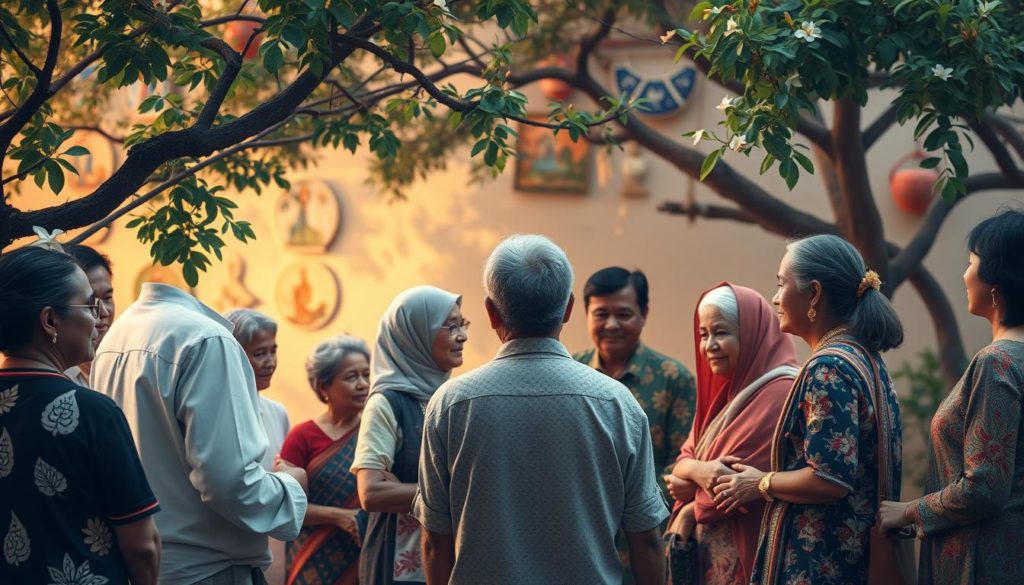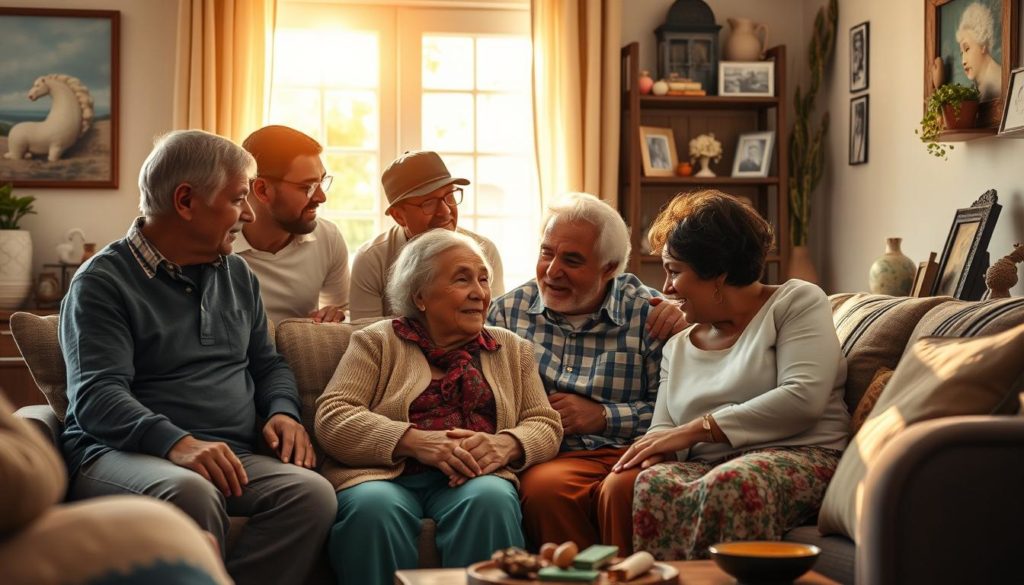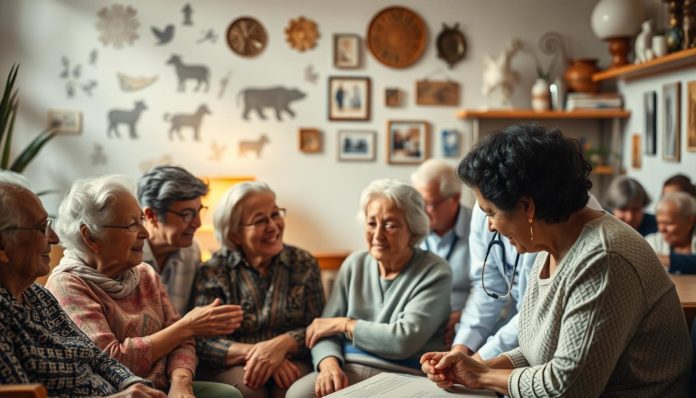Did you know nearly 60% of Alzheimer’s cases worldwide are not diagnosed? This reveals a deep need for understanding Race, Culture, and Alzheimer’s Care. This health issue affects people no matter their race, gender, or ethnicity. Yet, Alzheimer’s perception and management differ greatly among cultures.
Cultural beliefs play a big role in diagnosing and treating Alzheimer’s. These differences often lead to late diagnoses and not enough care. Let’s explore how various cultural views influence dementia care. We’ll uncover the complex issues at the core of this global health matter.
By grasping these cultural details, we can aim for fairer dementia care disparities solutions. It’s crucial to see and tackle the distinct hurdles each group faces with Alzheimer’s care.
The Impact of Cultural Beliefs on Alzheimer’s Diagnosis
Cultural beliefs significantly shape the understanding and management of Alzheimer’s disease. Often, early signs of dementia are mistook for normal aging. This results in delays in getting medical help.

Tendency to View Alzheimer’s Signs as Normal Aging
Many communities see dementia signs as just getting older. This view stops them from recognizing these signs as Alzheimer’s. It makes it hard to diagnose early, which is key for good care.
Lack of Awareness and Education
Many Black, Hispanic, and Asian American communities lack detailed Alzheimer’s education. This leads to less reporting and diagnosing of the disease. Increasing mental health awareness is vital to fix this issue.
Distrust in Western Medicine
Due to historical injustices, several ethnic groups distrust Western medicine. This wariness keeps some from seeking professional health advice or joining clinical studies. It makes diagnosing and treating Alzheimer’s more difficult.
Influence of Religious Beliefs
Religious beliefs deeply influence how people deal with Alzheimer’s disease. Often, caregivers use faith to handle the stress. While helpful emotionally, it might delay them from getting medical care.
Race, Culture, and Alzheimer’s Care: How Different Communities Are Affected
Understanding dementia care for minority populations means knowing their unique cultures and social standards. For example, African American communities often depend on firm family bonds for in-home Alzheimer’s care. Hispanic families see caregiving as a family responsibility, based on deep cultural beliefs.

Asian American families usually share caregiving across generations under one roof. On the other hand, Native American groups blend traditional healing in their Alzheimer’s care, showing their cultural and spiritual heritage.
The need for cultural sensitivity in Alzheimer’s support is clear. Health workers should adjust their care techniques to fit these distinct practices. Meanwhile, LGBTQ individuals might not have family support and face bias in care settings. This shows a need for care places that are welcoming and adjusted for everyone.
Variations in care show that Alzheimer’s care disparities are rooted in many cultural, social, and financial elements. By understanding and tackling these issues, we can provide better, kinder care to all communities involved.
The Role of Family in Alzheimer’s Care within Diverse Populations
Family caregiving is vital in Alzheimer’s care across different cultures. How care is given often mirrors deep traditions and values. It’s important to know these cultural differences to offer proper support.
Close Family Ties Among Hispanic Americans
For Hispanic Americans, caring for family members with Alzheimer’s is a deep commitment. It’s common for women to take on the main caregiving role. This reflects the strong family connections in their community.
Filial Piety in Asian Cultures
In Asia, respecting and caring for elders is a core value. This belief means families usually care for older members at home. Because of this, they might not seek professional help quickly.
Home Care for Native American Elders
Native Americans highly respect their elders, preferring home care. This is especially true for those with Alzheimer’s. But, getting a diagnosis and professional help can be hard. These unique needs must be addressed.
A look at how different cultures handle Alzheimer’s care in the family:
| Cultural Group | Primary Caregivers | Key Cultural Value | Common Challenges |
|---|---|---|---|
| Hispanic Americans | Family members, primarily women | Close family ties | Balancing care with other responsibilities |
| Asian Cultures | Family members, particularly children | Filial piety | Delay in seeking professional help |
| Native American Communities | Family members, respect for elders | Home care preference | Access to professional care |
Challenges Faced by the LGBTQ Community in Alzheimer’s Care
The LGBTQ community faces unique hurdles in Alzheimer’s care. These include limited family support, social isolation, and the need for culturally aware caregivers.
Lack of Family Support
LGBTQ elders often lack family support for Alzheimer’s care. Traditional family setups may not exist for them. This means they have fewer people to rely on for care and emotional support. Such a situation underscored the importance of finding external networks. These networks help improve their life quality and stability.
Loneliness and Social Isolation
Loneliness is a big issue due to the scarcity of family support. This makes fostering inclusive environments and support networks vital. It helps lessen the loneliness LGBTQ people may feel and supports their well-being.
Importance of Finding Culturally Competent Care
It’s critical to access care that understands LGBTQ elders’ unique needs. Care providers need proper training in cultural competence. This ensures respectful and relevant care. Culturally sensitive caregiving means LGBTQ elders get the attention and respect they need during their Alzheimer’s care journey.
| Challenge | Impact | Solution |
|---|---|---|
| Lack of Family Support | Increased caregiving burden | Build external support networks |
| Social Isolation | Greater instances of loneliness | Create inclusive environments |
| Finding Culturally Competent Care | Inadequate care due to lack of understanding | Train healthcare providers |
Ethnic Disparities in Alzheimer’s Diagnosis and Treatment
Ethnic differences in Alzheimer’s diagnosis and care are big and complex. African Americans and Hispanics face many hurdles in getting diagnosed on time. This is while they have a higher risk of developing the disease compared to white people.
Underdiagnosis in African American and Hispanic Populations
A study by the National Institute on Aging found that Black individuals are 35% less likely to get an Alzheimer’s diagnosis than whites. Hispanic groups also face significant underdiagnosis. These differences lead to worse outcomes for these communities.
The Role of Cardiovascular Health
Cardiovascular health plays a big role in dementia. African Americans and Hispanics often have more heart-related issues. These increase the risk of Alzheimer’s. Sadly, these health problems aren’t always considered during diagnosis. This makes it hard to manage and reduce symptoms in time.
Socioeconomic Factors Influencing Care
The effect of socioeconomic status on Alzheimer’s care is huge. Issues like poor access to healthcare, money problems, and less health knowledge hit minority groups hard. This results in late diagnoses and not enough support.
| Population Group | Likelihood of Diagnosis | Socioeconomic Impact | Cardiovascular Health Factors |
|---|---|---|---|
| White | High | Lower impact | Moderate |
| African American | Low | High impact | High |
| Hispanic | Low | High impact | High |
Culturally Sensitive Approaches to Alzheimer’s Care
It’s critical to offer culturally sensitive care to Alzheimer’s patients. This improves treatment effectiveness. Understanding a patient’s cultural background can make a big difference in care quality.
Key approaches highlight the importance of cultural understanding in healthcare.
Importance of Cultural Competence in Medical Practice
Healthcare cultural competence means knowing a patient’s cultural context. Doctors and nurses should understand cultural views on illness and treatment. This builds trust, improves communication, and ensures care instructions are clear.
Customized Care Plans for Diverse Patients
Alzheimer’s care plans must consider cultural, social, and linguistic needs. Tailoring care to these needs makes patients feel supported. For example, including preferred foods and spiritual practices can boost satisfaction and outcomes.
Active Involvement of Family Members
Family involvement is key in dementia care, particularly in diverse cultures. Families provide insights into the patient’s lifestyle and preferences. Including family in care decisions creates a supportive setting. It also educates families about dementia, reducing stigma.
| Key Components | Description |
|---|---|
| Cultural Competence in Healthcare | Incorporating cultural understanding into medical practice to build trust and improve communication. |
| Personalized Alzheimer’s Care Plans | Customizing care plans that respect cultural, social, and linguistic needs. |
| Family Involvement in Dementia Care | Engaging family members in care decisions to ensure a culturally sensitive approach. |
Overcoming Stigma Related to Alzheimer’s in Different Cultures
Alzheimer’s stigma is a big problem. It stops people from getting diagnosed early and treated. Many cultures see mental health negatively, which makes people hesitant to seek help for Alzheimer’s. This fear means they might not get the medical help they need. They also might not get support from their community or family.
Effects of Stigma on Seeking Help
Cultural stigma of dementia makes it hard for people and their families. With Alzheimer’s stigma, people might feel too ashamed to talk about their condition. They put off important talks. This means they miss chances for help early on. Being afraid of what others will think makes managing Alzheimer’s even tougher.
{ “It’s not just the battle against the disease; it’s the fight against misconceptions and cultural biases,” notes Dr. Maria Carrillo, Chief Science Officer at the Alzheimer’s Association.}
Strategies to Reduce Stigma
To fight Alzheimer’s stigma, we need good anti-stigma strategies. These can include:
- Education and Awareness Programs: These help the community understand better and be more supportive.
- Professional Support: We push for health care workers to be sensitive to different cultures.
- Support Groups: These are places where people with Alzheimer’s and families can talk and support each other.
- Open Dialogues: We encourage talking about Alzheimer’s openly to make it less of a taboo.
We have to tackle stigmas that are specific to cultures. It’s important to know these unique challenges. Then people with Alzheimer’s can feel brave enough to seek help for Alzheimer’s without being scared of being judged.
The Role of Community Support in Alzheimer’s Care for Minority Populations
Community involvement is key in aiding Alzheimer’s care for minorities. Communities can boost awareness and offer help to those with Alzheimer’s. They provide emotional support, too.
Community Education and Awareness Programs
It’s vital to push dementia care education in communities. Educational programs work to raise awareness and fight myths. They also help people get care. Community members learn to support each other through these efforts.
Initiatives include workshops and info sessions. They’re aimed at making community support for Alzheimer’s stronger.
Faith-Based Support Networks
Faith groups play a big role in dementia support. They offer emotional and social support to those in need. These groups use their community ties to help.
They hold regular meetings, prayer groups, and counseling. All of these efforts support the well-being of people with Alzheimer’s and their families.
Volunteer Opportunities and Community Involvement
Getting people to volunteer in Alzheimer’s care boosts support. Volunteers can teach, advocate, or help with daily tasks. They might also run support groups or keep someone company.
These efforts enhance community bonds and a sense of duty.
In conclusion, strong community support for Alzheimer’s care is crucial for minorities. By supporting dementia care education, faith-based efforts, and volunteering, communities can truly make a difference in the lives of those with dementia.
Future Directions: Improving Alzheimer’s Care for Diverse Populations
The United States is becoming more diverse. Because of this, improving Alzheimer’s care for different communities is now a key goal. We need to focus on multicultural Alzheimer’s care approaches. Future plans aim to improve Alzheimer’s care strategies to be fair and work well for everyone.
First, it’s crucial to do more research to get why Alzheimer’s affects ethnic and racial groups differently. By understanding the unique risks and health patterns of various groups, we can make care plans that meet each group’s needs. This step is important for better dementia care and reducing health care differences.
It’s also important to work with organizations that want to make dementia treatment fair. Encouraging minority groups to join clinical trials and health movements helps. This way, we can create care plans that consider everyone’s needs and likes. These actions will lead to a healthcare system that fully supports diverse groups facing Alzheimer’s.
FAQ
How do race and culture influence Alzheimer’s care?
Race and culture deeply impact how we view and handle Alzheimer’s. Different customs, beliefs, and social norms shape how people see symptoms and seek help. It shows the need for care that respects cultural differences.
What cultural beliefs impact the diagnosis of Alzheimer’s?
Many believe that Alzheimer’s symptoms are just normal aging. This leads to late diagnosis and care, mainly where there’s less knowledge of Alzheimer’s.
Why is there a lack of awareness about Alzheimer’s in some communities?
Black, Hispanic, and Asian American communities often know less about Alzheimer’s. This leads to fewer people reporting symptoms and getting diagnosed.
How does distrust in Western medicine affect Alzheimer’s care?
Distrust in Western medicine, especially among minority groups, makes underdiagnosis worse. Fears of being mistreated and not finding culturally aware doctors add to this distrust.
What role do religious beliefs play in Alzheimer’s caregiving?
In Alzheimer’s care, religion and faith help families deal with stress. These beliefs affect when and how they seek help, showing the need for care that understands these values.
How do different racial and ethnic communities experience Alzheimer’s care?
Alzheimer’s care looks different across cultures. From African American to LGBTQ folks, each group faces its own challenges and needs in care, shaped by their culture and access to healthcare.
What are the family caregiving roles in Hispanic American communities?
In Hispanic American families, caregiving often falls to women, tied closely by their strong family bonds. This can delay seeking outside help for Alzheimer’s.
How does filial piety affect Alzheimer’s care in Asian cultures?
Asian traditions call for caring for one’s parents, which may delay seeking professional care. This highlights the need for care that fits these cultural values.
What challenges do Native American communities face in Alzheimer’s care?
Native American groups prefer caring for elders at home out of respect. But, this can make getting professional Alzheimer’s care and correct diagnoses harder.
What specific challenges does the LGBTQ community face in Alzheimer’s care?
The LGBTQ community deals with unique Alzheimer’s care challenges. These include less family support and more isolation, underlining the need for accepting and skilled healthcare providers.
Are there disparities in Alzheimer’s diagnosis among African American and Hispanic populations?
African American and Hispanic folks are often diagnosed with Alzheimer’s later than white people. This is due to things like less access to healthcare and more heart health issues.
How can culturally sensitive approaches improve Alzheimer’s care?
By respecting patients’ cultural backgrounds in healthcare, Alzheimer’s care gets better. Tailoring care plans and including families helps. So does diverse staff and educating patients and families.
How does stigma related to Alzheimer’s impact different cultures?
Stigma often stops people from seeking Alzheimer’s help, especially where mental health issues are seen negatively. To change this, each culture needs specific education and open conversations.
What role does community support play in Alzheimer’s care for minority populations?
Community involvement is crucial in supporting Alzheimer’s care in minority groups. Through education and faith networks, awareness grows and care improves, helping everyone involved.
What are the future directions for improving Alzheimer’s care for diverse populations?
Looking ahead, we’re moving toward care that celebrates cultural differences. We’re focusing on equality in research and creating treatments that fit everyone’s needs. Involving minorities in trials and advocacy is also key.


